A Comprehensive Study of Language Development in Children
VerifiedAdded on 2023/06/11
|5
|984
|272
Essay
AI Summary
This essay delves into the stages and processes of language development in children, emphasizing the critical role of early interaction with family members in establishing a foundation for communication and language skills. It highlights the challenges children face in mastering a language and underscores the benefits of early language acquisition for academic success. The paper discusses practical tips for practicing newly learned language skills, such as engaging in conversations, using descriptive language, and incorporating music. Furthermore, it examines various theoretical perspectives on language development, including nativist, behaviorist, interactionist, and cognitive development perspectives, elucidating how each contributes to our understanding of how children acquire and develop language proficiency. The essay concludes that while teachers and family members play a crucial role, the learner's active participation is essential for effective language acquisition and development.
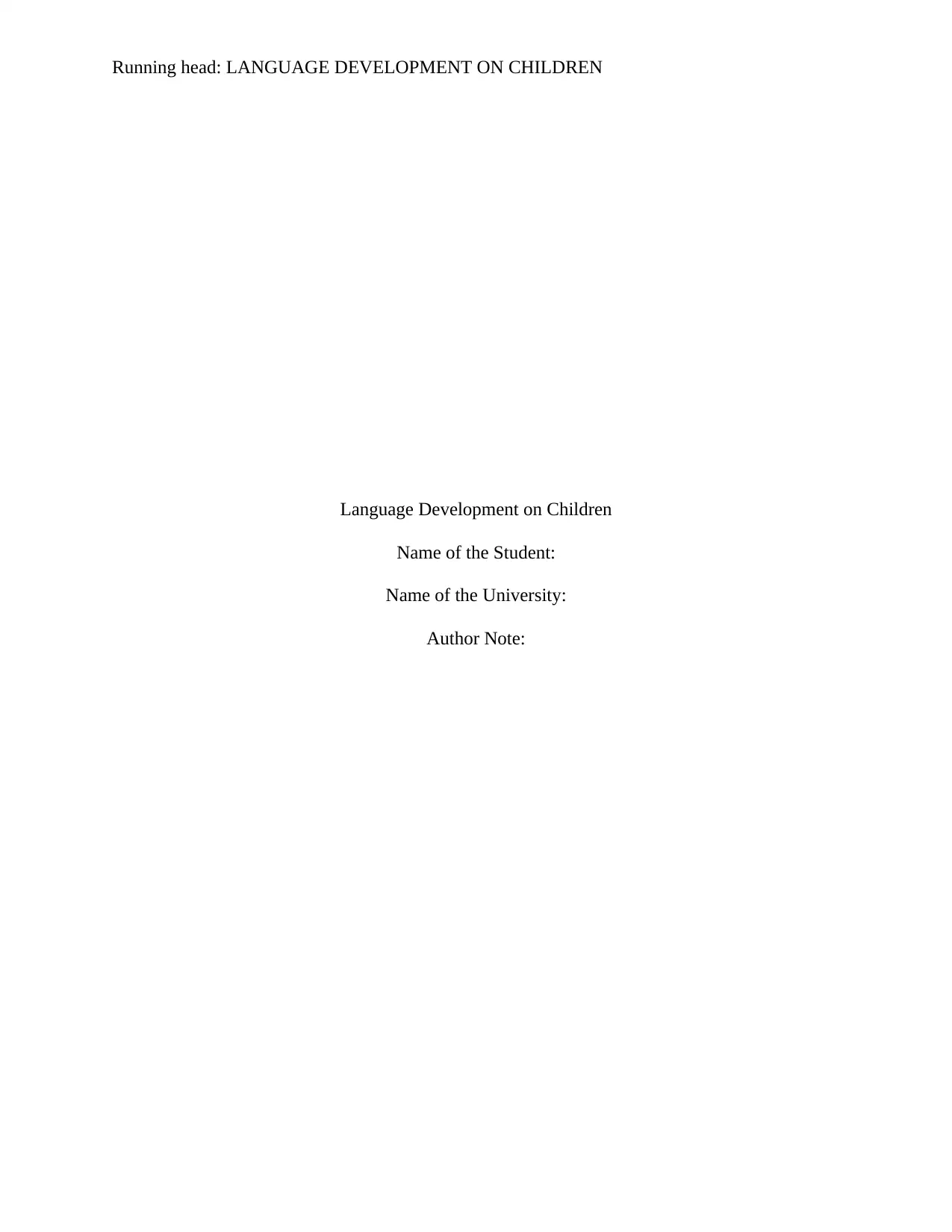
Running head: LANGUAGE DEVELOPMENT ON CHILDREN
Language Development on Children
Name of the Student:
Name of the University:
Author Note:
Language Development on Children
Name of the Student:
Name of the University:
Author Note:
Paraphrase This Document
Need a fresh take? Get an instant paraphrase of this document with our AI Paraphraser
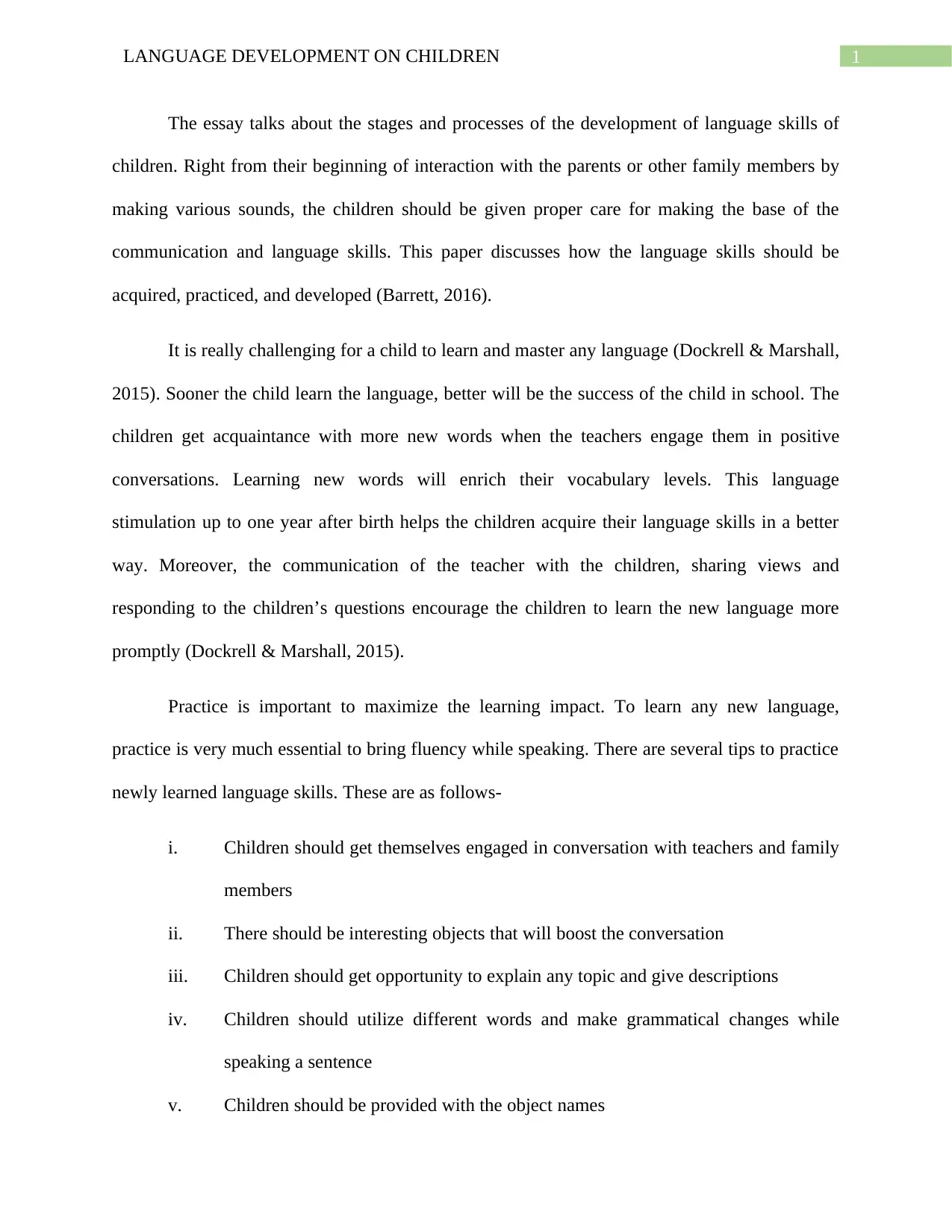
1LANGUAGE DEVELOPMENT ON CHILDREN
The essay talks about the stages and processes of the development of language skills of
children. Right from their beginning of interaction with the parents or other family members by
making various sounds, the children should be given proper care for making the base of the
communication and language skills. This paper discusses how the language skills should be
acquired, practiced, and developed (Barrett, 2016).
It is really challenging for a child to learn and master any language (Dockrell & Marshall,
2015). Sooner the child learn the language, better will be the success of the child in school. The
children get acquaintance with more new words when the teachers engage them in positive
conversations. Learning new words will enrich their vocabulary levels. This language
stimulation up to one year after birth helps the children acquire their language skills in a better
way. Moreover, the communication of the teacher with the children, sharing views and
responding to the children’s questions encourage the children to learn the new language more
promptly (Dockrell & Marshall, 2015).
Practice is important to maximize the learning impact. To learn any new language,
practice is very much essential to bring fluency while speaking. There are several tips to practice
newly learned language skills. These are as follows-
i. Children should get themselves engaged in conversation with teachers and family
members
ii. There should be interesting objects that will boost the conversation
iii. Children should get opportunity to explain any topic and give descriptions
iv. Children should utilize different words and make grammatical changes while
speaking a sentence
v. Children should be provided with the object names
The essay talks about the stages and processes of the development of language skills of
children. Right from their beginning of interaction with the parents or other family members by
making various sounds, the children should be given proper care for making the base of the
communication and language skills. This paper discusses how the language skills should be
acquired, practiced, and developed (Barrett, 2016).
It is really challenging for a child to learn and master any language (Dockrell & Marshall,
2015). Sooner the child learn the language, better will be the success of the child in school. The
children get acquaintance with more new words when the teachers engage them in positive
conversations. Learning new words will enrich their vocabulary levels. This language
stimulation up to one year after birth helps the children acquire their language skills in a better
way. Moreover, the communication of the teacher with the children, sharing views and
responding to the children’s questions encourage the children to learn the new language more
promptly (Dockrell & Marshall, 2015).
Practice is important to maximize the learning impact. To learn any new language,
practice is very much essential to bring fluency while speaking. There are several tips to practice
newly learned language skills. These are as follows-
i. Children should get themselves engaged in conversation with teachers and family
members
ii. There should be interesting objects that will boost the conversation
iii. Children should get opportunity to explain any topic and give descriptions
iv. Children should utilize different words and make grammatical changes while
speaking a sentence
v. Children should be provided with the object names
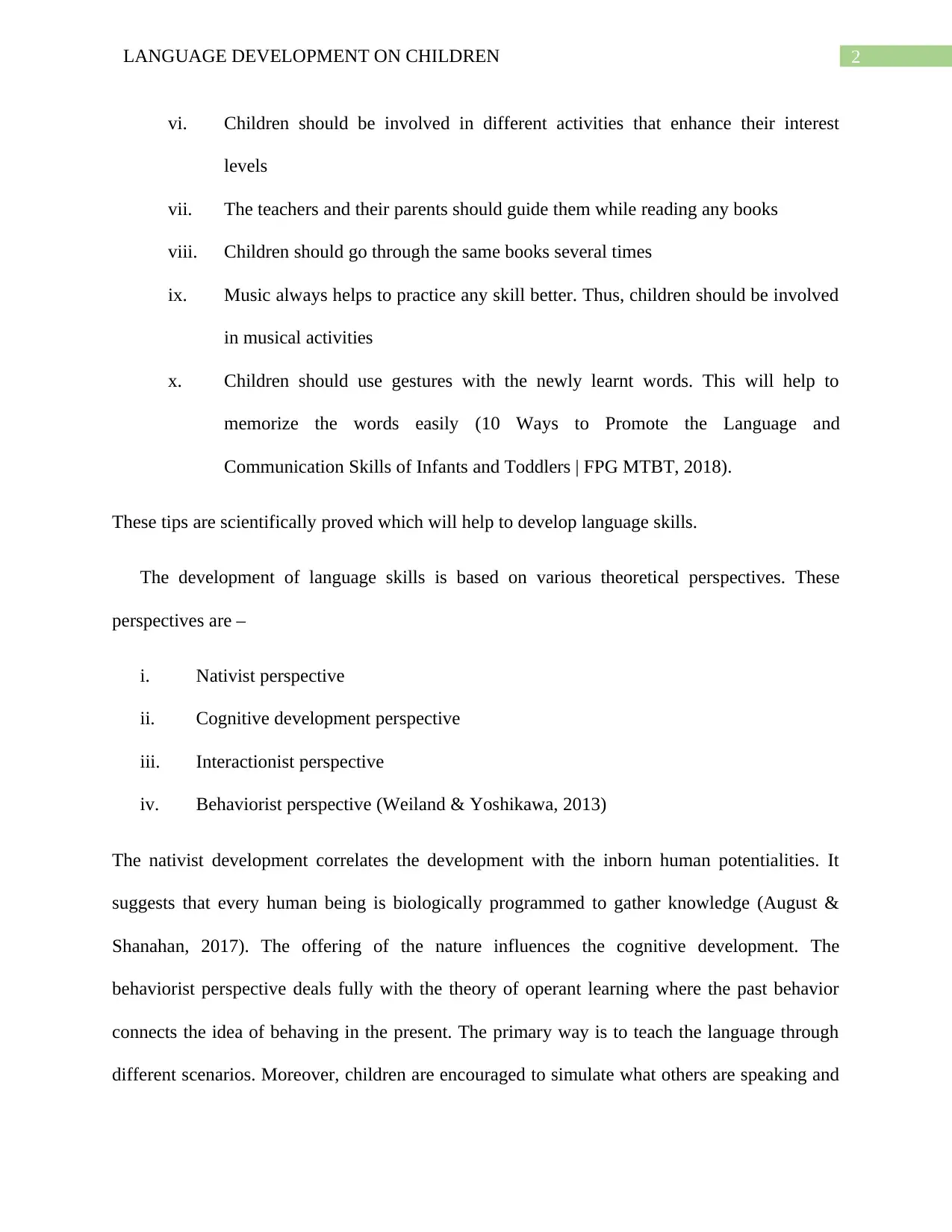
2LANGUAGE DEVELOPMENT ON CHILDREN
vi. Children should be involved in different activities that enhance their interest
levels
vii. The teachers and their parents should guide them while reading any books
viii. Children should go through the same books several times
ix. Music always helps to practice any skill better. Thus, children should be involved
in musical activities
x. Children should use gestures with the newly learnt words. This will help to
memorize the words easily (10 Ways to Promote the Language and
Communication Skills of Infants and Toddlers | FPG MTBT, 2018).
These tips are scientifically proved which will help to develop language skills.
The development of language skills is based on various theoretical perspectives. These
perspectives are –
i. Nativist perspective
ii. Cognitive development perspective
iii. Interactionist perspective
iv. Behaviorist perspective (Weiland & Yoshikawa, 2013)
The nativist development correlates the development with the inborn human potentialities. It
suggests that every human being is biologically programmed to gather knowledge (August &
Shanahan, 2017). The offering of the nature influences the cognitive development. The
behaviorist perspective deals fully with the theory of operant learning where the past behavior
connects the idea of behaving in the present. The primary way is to teach the language through
different scenarios. Moreover, children are encouraged to simulate what others are speaking and
vi. Children should be involved in different activities that enhance their interest
levels
vii. The teachers and their parents should guide them while reading any books
viii. Children should go through the same books several times
ix. Music always helps to practice any skill better. Thus, children should be involved
in musical activities
x. Children should use gestures with the newly learnt words. This will help to
memorize the words easily (10 Ways to Promote the Language and
Communication Skills of Infants and Toddlers | FPG MTBT, 2018).
These tips are scientifically proved which will help to develop language skills.
The development of language skills is based on various theoretical perspectives. These
perspectives are –
i. Nativist perspective
ii. Cognitive development perspective
iii. Interactionist perspective
iv. Behaviorist perspective (Weiland & Yoshikawa, 2013)
The nativist development correlates the development with the inborn human potentialities. It
suggests that every human being is biologically programmed to gather knowledge (August &
Shanahan, 2017). The offering of the nature influences the cognitive development. The
behaviorist perspective deals fully with the theory of operant learning where the past behavior
connects the idea of behaving in the present. The primary way is to teach the language through
different scenarios. Moreover, children are encouraged to simulate what others are speaking and
⊘ This is a preview!⊘
Do you want full access?
Subscribe today to unlock all pages.

Trusted by 1+ million students worldwide
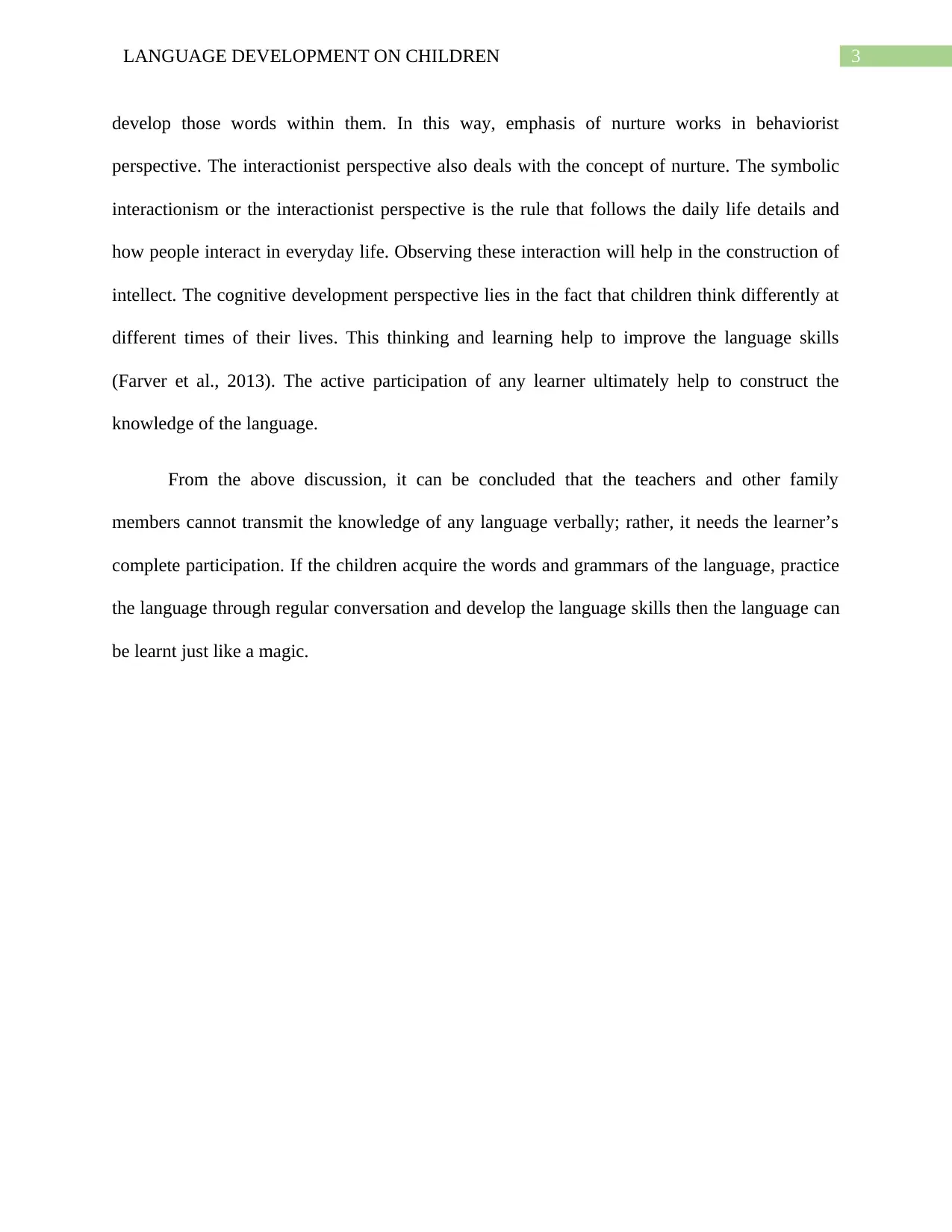
3LANGUAGE DEVELOPMENT ON CHILDREN
develop those words within them. In this way, emphasis of nurture works in behaviorist
perspective. The interactionist perspective also deals with the concept of nurture. The symbolic
interactionism or the interactionist perspective is the rule that follows the daily life details and
how people interact in everyday life. Observing these interaction will help in the construction of
intellect. The cognitive development perspective lies in the fact that children think differently at
different times of their lives. This thinking and learning help to improve the language skills
(Farver et al., 2013). The active participation of any learner ultimately help to construct the
knowledge of the language.
From the above discussion, it can be concluded that the teachers and other family
members cannot transmit the knowledge of any language verbally; rather, it needs the learner’s
complete participation. If the children acquire the words and grammars of the language, practice
the language through regular conversation and develop the language skills then the language can
be learnt just like a magic.
develop those words within them. In this way, emphasis of nurture works in behaviorist
perspective. The interactionist perspective also deals with the concept of nurture. The symbolic
interactionism or the interactionist perspective is the rule that follows the daily life details and
how people interact in everyday life. Observing these interaction will help in the construction of
intellect. The cognitive development perspective lies in the fact that children think differently at
different times of their lives. This thinking and learning help to improve the language skills
(Farver et al., 2013). The active participation of any learner ultimately help to construct the
knowledge of the language.
From the above discussion, it can be concluded that the teachers and other family
members cannot transmit the knowledge of any language verbally; rather, it needs the learner’s
complete participation. If the children acquire the words and grammars of the language, practice
the language through regular conversation and develop the language skills then the language can
be learnt just like a magic.
Paraphrase This Document
Need a fresh take? Get an instant paraphrase of this document with our AI Paraphraser
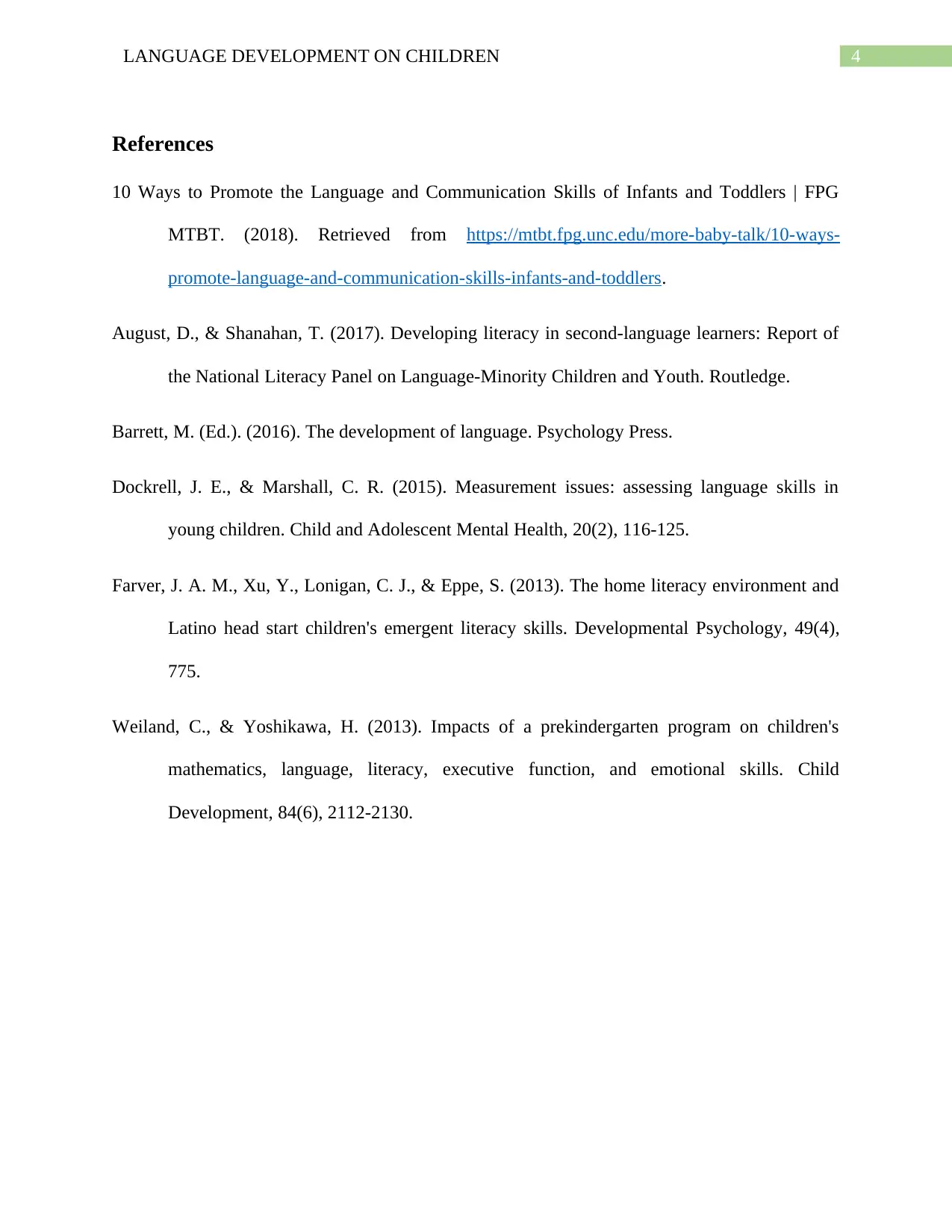
4LANGUAGE DEVELOPMENT ON CHILDREN
References
10 Ways to Promote the Language and Communication Skills of Infants and Toddlers | FPG
MTBT. (2018). Retrieved from https://mtbt.fpg.unc.edu/more-baby-talk/10-ways-
promote-language-and-communication-skills-infants-and-toddlers.
August, D., & Shanahan, T. (2017). Developing literacy in second-language learners: Report of
the National Literacy Panel on Language-Minority Children and Youth. Routledge.
Barrett, M. (Ed.). (2016). The development of language. Psychology Press.
Dockrell, J. E., & Marshall, C. R. (2015). Measurement issues: assessing language skills in
young children. Child and Adolescent Mental Health, 20(2), 116-125.
Farver, J. A. M., Xu, Y., Lonigan, C. J., & Eppe, S. (2013). The home literacy environment and
Latino head start children's emergent literacy skills. Developmental Psychology, 49(4),
775.
Weiland, C., & Yoshikawa, H. (2013). Impacts of a prekindergarten program on children's
mathematics, language, literacy, executive function, and emotional skills. Child
Development, 84(6), 2112-2130.
References
10 Ways to Promote the Language and Communication Skills of Infants and Toddlers | FPG
MTBT. (2018). Retrieved from https://mtbt.fpg.unc.edu/more-baby-talk/10-ways-
promote-language-and-communication-skills-infants-and-toddlers.
August, D., & Shanahan, T. (2017). Developing literacy in second-language learners: Report of
the National Literacy Panel on Language-Minority Children and Youth. Routledge.
Barrett, M. (Ed.). (2016). The development of language. Psychology Press.
Dockrell, J. E., & Marshall, C. R. (2015). Measurement issues: assessing language skills in
young children. Child and Adolescent Mental Health, 20(2), 116-125.
Farver, J. A. M., Xu, Y., Lonigan, C. J., & Eppe, S. (2013). The home literacy environment and
Latino head start children's emergent literacy skills. Developmental Psychology, 49(4),
775.
Weiland, C., & Yoshikawa, H. (2013). Impacts of a prekindergarten program on children's
mathematics, language, literacy, executive function, and emotional skills. Child
Development, 84(6), 2112-2130.
1 out of 5
Related Documents
Your All-in-One AI-Powered Toolkit for Academic Success.
+13062052269
info@desklib.com
Available 24*7 on WhatsApp / Email
![[object Object]](/_next/static/media/star-bottom.7253800d.svg)
Unlock your academic potential
Copyright © 2020–2026 A2Z Services. All Rights Reserved. Developed and managed by ZUCOL.





